AAVMC’S Inaugural Virtual Conference Real Success in Every Respect
A record 365 attendees tuned into the AAVMC’s first virtual conference, “Catalyze 2021: Connect and Innovate in the Face of Global Challenges,” March 3-5. 2021. Conference officials noted registrants representing 37 U.S. schools, 20 international schools (including 14 from the University of Seoul in South Korea) and about a dozen corporations and associations.
The AAVMC managed to present last year’s conference just days before the pandemic jolted the world “fast-forward” into digital interaction. This year’s virtual conference was presented seamlessly through a specially created conference website integrating Zoom sessions and breakout rooms with a content-rich platform, a virtual photo booth, live question-and-answer sessions, and interactive social media chats.
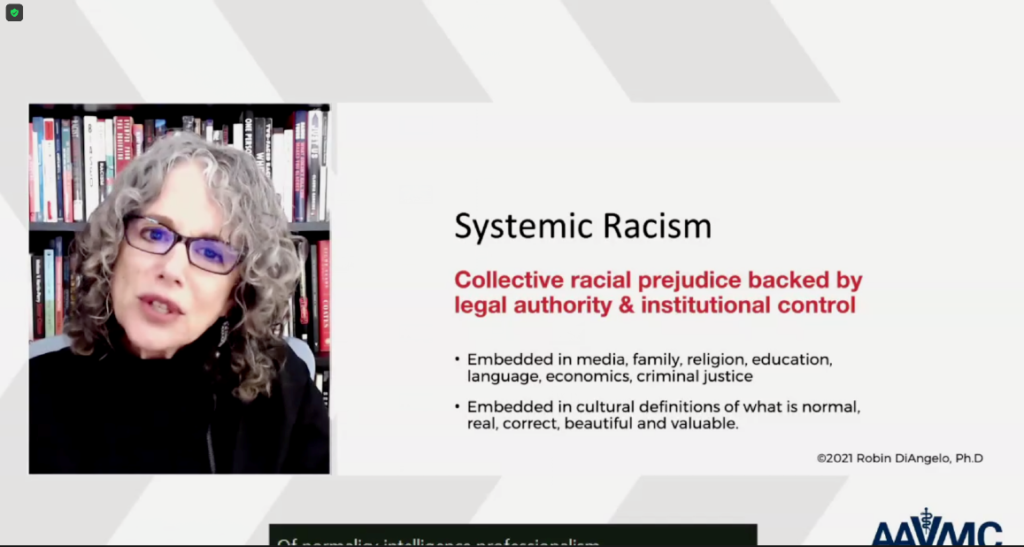
More than 20 online sessions spread over three days covered diverse topics such as “Innovative Veterinary Admissions Practices to Enhance Diversity,” “How Strategic Communications Can Increase Your Reach,” “How Debt is Changing the Face of the Profession,” and “Building a Pipeline of Leaders for Academic Veterinary Medicine.”
In plenary sessions, three keynote speakers covered socially relevant topics—systemic racism (Dr. Robin DiAngelo), ableism (Dr. Jay Dolmage), and how to ask probing, transformative questions to spark creativity and create dynamic change (Dr. Hal Gregersen).
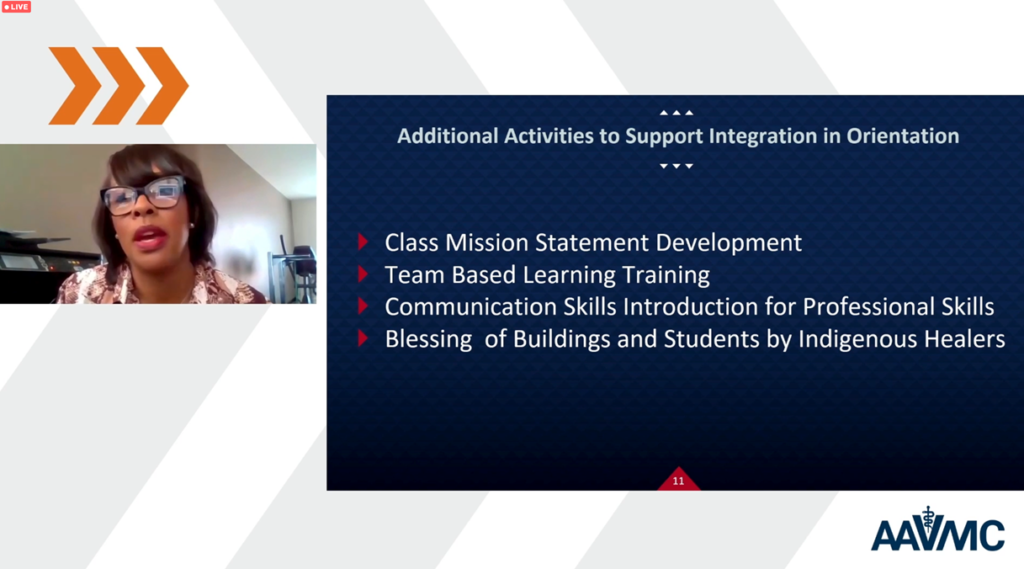
How the Pandemic Changed Teaching
Numerous sessions focused on how schools and colleges of veterinary medicine responded to the pandemic, such as “Global Lessons in Shifting to Online Veterinary Education,” and “The Impact of the COVID-19 Pandemic on Assessment Strategies in Health Professions Education: Lessons Learned About Assessment During the Lockdown.” In a session on “Responses to a Pandemic: In the Trenches of Rapid Curricular Change,” speakers presented survey results showing that, despite negative pandemic pressures, even in a post-pandemic world, faculty plan to maintain some elements of pandemic-altered, online education, such as online lectures. Among the survey comments: “This emergency put teaching back as my primary focus.”
A session on the AAVMC’s Competency-based Veterinary Medical Education (CBVE) illustrated how an emphasis on competency versus traditional measures such as grades helped some faculty transition to new educational models during the pandemic.
Learn more about CBVE in this video, shown during the conference.
A Wellbeing Emphasis
Several sessions focused on wellbeing and coping with stress, such as “Anxiety and the Brain: Strategies for Learning, Memory, and Emotional Regulation,” and “The High Cost of Resilience: A Discussion of the Overarching Impacts of Veterinary Student Stress.” In the session on resilience, speaker Dr. Jeremiah Grissett from Oklahoma State University said that veterinary medical school is stressful and the “ordinary magic” of resilience is good, but he warned that an overemphasis on resilience can inadvertently place too much pressure and blame on students. “We need to normalize asking for help,” he said.
The AAVMC’s Director of Wellbeing Ms. Makenzie Peterson updated attendees on the association’s Wellbeing Operations Plan. The AAVMC created Peterson’s position last year to develop and implement programs that promote wellbeing at AAVMC member institutions. Peterson developed monographs on topics such as “Grief, Loss and Death During COVID-19,” that were particularly pertinent during the pandemic. (That monograph and others can be found on the bottom of this page.)
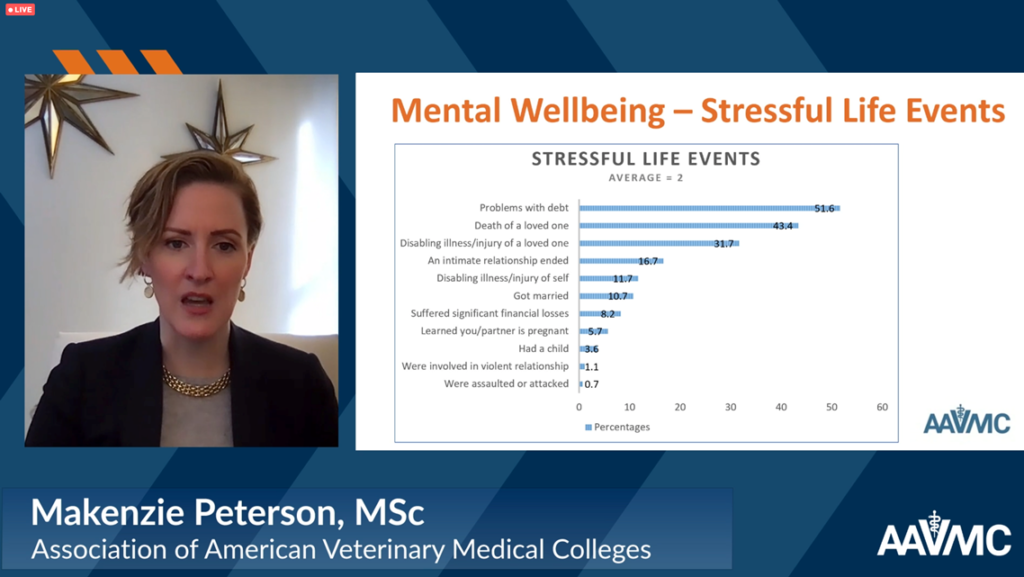
Peterson said that many CVMs are addressing issues at the treatment or screening level but should focus more on prevention. “Yoga and meditation will not save the health professions,” she said, “How do we look at wellbeing across the entire academic lifespan?”
She emphasized the need for an institution-wide approach to wellbeing and plans to roll out a variety of tools to help schools implement wellness measures. She said that a comprehensive approach would include curricula/trainings, emotional and social support and an improved learning environment.
She acknowledged the high-stress environment of veterinary medical school can sometimes be motivational, but “unchecked stress leads to distress.”
Honoring Award Winners Who Exemplify True Success
AAVMC award-winners were introduced during the conference via compelling videos that profiled honorees. Videos profiled Distinguished Veterinary Teacher Award recipient Dr. Stephen Hines, Excellence in Research Award recipient Dr. Juergen (Jürgen) A. Richt, Iverson Bell Award recipient Dr. Ruby L. Perry, Billy E. Hooper Award for Distinguished Service Award recipient Dr. Corrie Brown, and Senator John Melcher Leadership in Public Policy Award recipient Dr. Michael J. Blackwell.
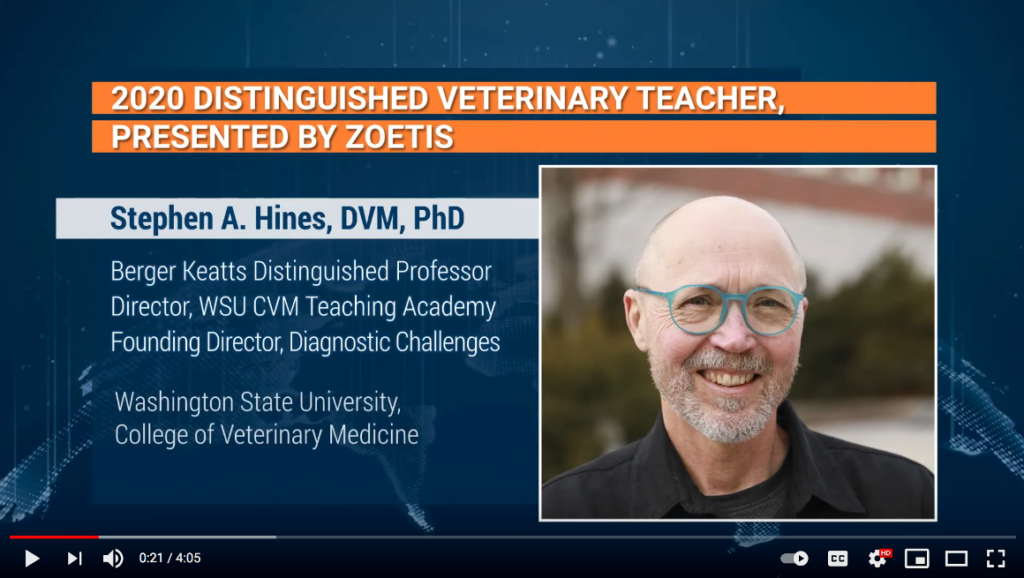
Questions are the answer. Questions are catalytic … The best leaders without exception ask exceptional questions that others miss.”
Dr. Hal Gregers
Keynoters: Time for Innovation and True Societal Change
Among the keynote speakers, there were some common themes, such as the importance of asking the right questions and how wrestling with the answers can be an uncomfortable, but necessary process.
“Questions are the answer,” said Massachusetts Institute of Technology (MIT) leadership expert and keynote Gregersen. “Questions are catalytic … The best leaders without exception ask exceptional questions that others miss.” Gregersen is the author of The Innovator’s DNA: Mastering the Five Skills of Disruptive Innovators. He said that “listening deeply” is the key to asking the right questions and breaking through to create disruptive innovation. He encouraged people to conduct “question audits,” or brainstorming sessions that consist of only questions in order to “foster fearless inquiry.”
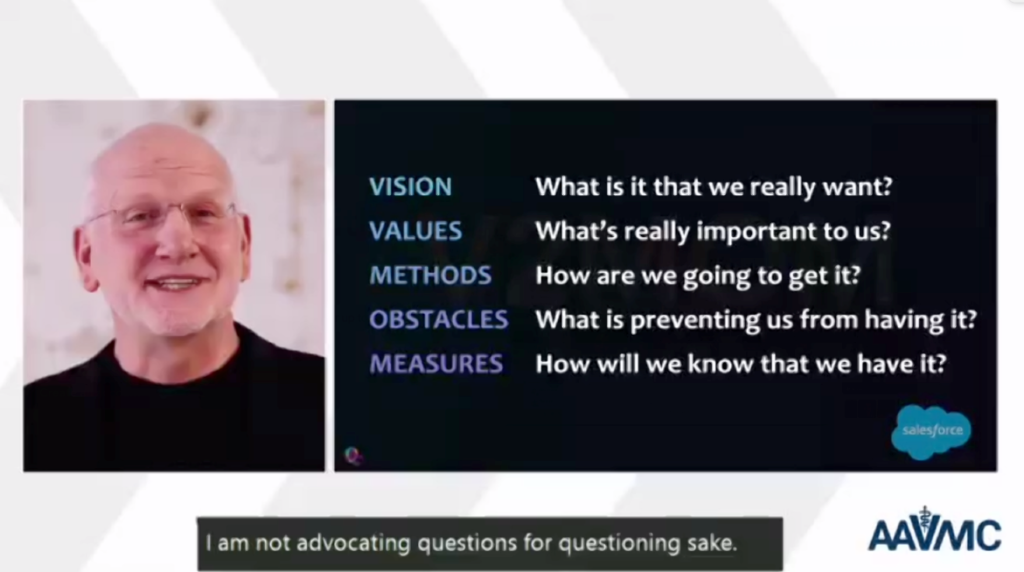
“We all need to care about disability,” said keynote speaker Dr. Jay Dolmage, noting that the plight of disabled individuals is under-recognized and under-resourced. Dolmage, the author of Academic Ableism: Disability and Higher Education, used the architecture of ramps and stairs as metaphors for access vs. obstacles that can exclude or discourage the disabled. He pointed out that providing accommodations for the disabled is a vital part of inclusivity.
“There is no ‘normal’ body or mind,” he said. “We will all become disabled at some point. We need to care about disability now.”
During a post-session Twitter chat, Dolmage commented that, “Everything cool that your smartphone does was originally a special technology for disabled people. Now we all benefit from them being available to all of us.” He also encouraged attendees to learn from disabled people and warned that, “the most dangerous assumption we can ever have about a disabled person is that they cannot do something.”
To view the Keynote Presentation Please click here. Access a transcript of the presentation here. Access the Twitter chat with Dr. Dolmage here.
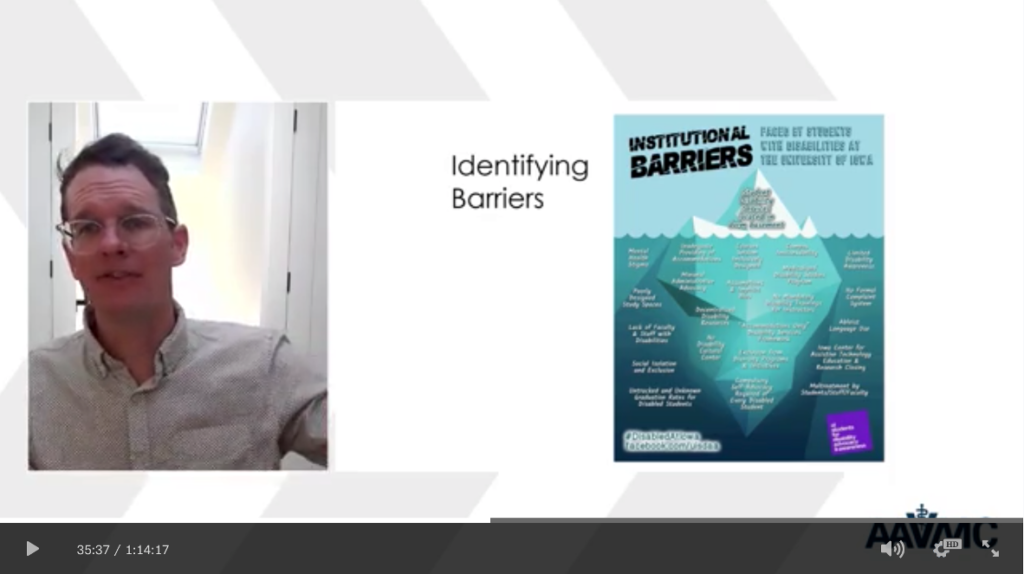
DiAngelo illustrated the pervasiveness of racism in society by asking the white people in the audience some penetrating questions to challenge their assumptions about race… “Did your parents have Black friends?” “How often did you have a teacher of a different race?” “How many Black people were at your wedding?”
She presented multiple statistics to show the overwhelming prevalence of white males in powerful positions and emphasized that not being racist is “not about niceness or meanness,” but extends to more deeply entrenched issues and beliefs that might include measuring the value of something (schools, neighborhoods) by the absence of Black people.
She acknowledged that admitting and dealing with racism is necessarily uncomfortable and emphasized the importance of engaging with issues that revolve around racism and being proactively mindful of racism’s role in everything from hiring and admissions to media portrayals and interpersonal relationships. She said that it’s not up to white people to judge the validity of the Black experience, but to listen, learn and do better.
Conference content, with the exception of Dr. DiAngelo’s presentation, will remain accessible to conference attendees at no additional charge for the next month.
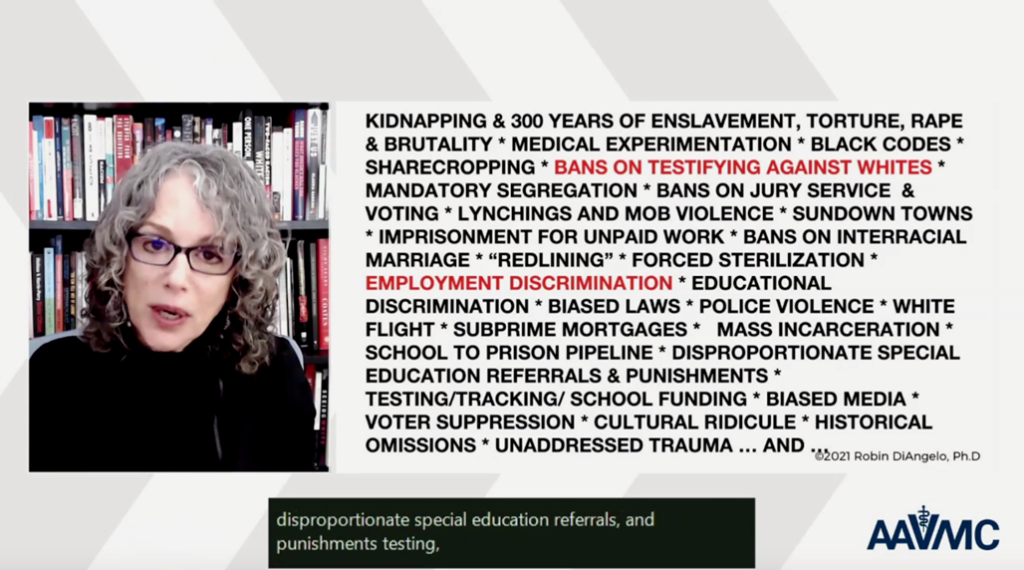
Virtual Advocacy Day Successful Venture as Well
The annual conference wasn’t the only virtual presentation. For the first time ever, the AAVMC’s Advocacy Day was orchestrated online… and it went very well, according to AAVMC Governmental Affairs Director Kevin Cain.
A total of 87 participants from 24 states representing 91 House districts and 53 Senate offices representing 27 states conducted 144 meetings during the event, which was held over two days.
AAVMC volunteers focused on three strategic AAVMC priorities as well as issues unique to their own schools and colleges during the event.




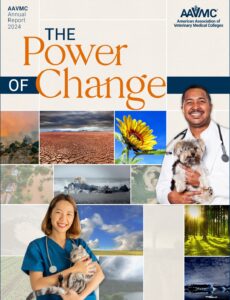
SHARE